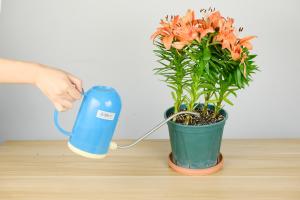Introduction:
Plants are essential for the survival of humans and animals on earth. Without plants, the food chain breaks, and it would be impossible for life to exist. However, plants face multiple threats, one of which is insect infestation. Insects can damage plants, reducing their growth and productivity. Farmers and gardeners use different methods to protect their crops from insects, including spraying water on plants. In this article, we will explore how spraying water on plants can protect them from insects.
Why do Plants Need Water?
Before we discuss how spraying water on plants protects them from insects, we need to understand why plants need water. Plants use water to perform photosynthesis, a process by which they make their food. They also use water to transport nutrients and minerals from their roots to other parts of the plant. Finally, water provides plants with the necessary moisture to keep their cells turgid and maintain their shape.
How Do Insects Damage Plants?
Insects can damage plants in multiple ways. Some insects feed on the leaves, stem or roots of the plant, while others puncture the leaves or suck the sap. Insects can also carry bacteria or viruses that can cause diseases in plants. Infested plants can show signs of stunted growth, yellowing of leaves, wilting or even death.
How Does Spraying Water on Plants Protect them from Insects?
Now that we know the importance of water for plants and the damaging effects of insects let us see how spraying water can protect plants from insects. Spraying water on plants can dislodge insects from the plant's surface. Insects such as aphids, spider mites, and whiteflies thrive in warm and dry conditions. However, when water is sprayed on the leaves, stem and underside of the leaves, it makes the microclimate cooler and humid. As a result, the insects lose their grip on the plant, making it challenging for them to crawl on the leaves or puncture the leaves to suck the sap. Water droplets can also create a physical barrier between the insect and the plant surface, preventing its feeding. Moreover, water can help to wash away the honeydew, a sticky substance that aphids excrete, which attracts ants and can promote fungal growth. When honeydew is washed away, it reduces the likelihood of attracting ants and other insects to the plant.
How Often Should You Spray Water on Plants?
Now that we know that spraying water on plants can protect them from insects, how often should we spray water on plants? The frequency of spraying water on plants depends on several factors, such as the weather, the type of plant and the degree of infestation. In general, it is recommended to spray water on plants twice a day, preferably in the morning and evening. However, if the weather is hot and dry, you may need to spray water on plants more often. Alternatively, if the plant has a severe infestation, you may need to increase the frequency of spraying. However, it is essential to avoid overwatering the plants, as this can lead to fungal growth and other diseases.
Conclusion:
In conclusion, spraying water on plants can be an effective way to protect them from insects. It can create a cooler and humid microclimate, making it difficult for insects to feed on the plant's surface. Spraying water can also help to wash away honeydew, prevent fungal growth and reduce the likelihood of attracting ants and other insects to the plant. However, it is essential to spray water on plants strategically and avoid overwatering them, as this can lead to other problems. With proper care and management, spraying water on plants can be an effective way to protect them from insects and promote their growth and productivity.

 how many times do yo...
how many times do yo... how many planted tre...
how many planted tre... how many pine trees ...
how many pine trees ... how many pecan trees...
how many pecan trees... how many plants comp...
how many plants comp... how many plants can ...
how many plants can ... how many plants and ...
how many plants and ... how many pepper plan...
how many pepper plan...






























